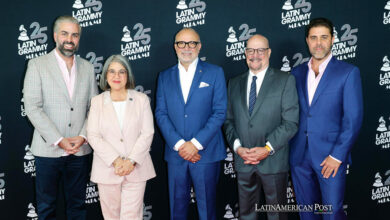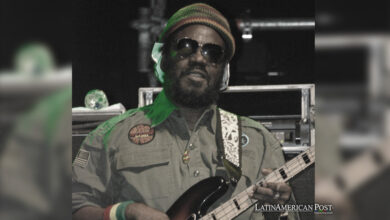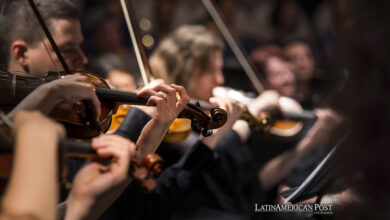J Balvin vs. Resident: Who Represents The True “Urban Genre”?
J Balvin and Residente fought for not agreeing on who really represents the "urban genre".

The confrontation between J Balvin and Residente on social networks caused great controversy and incidentally created a debate about what the “urban genre” really is. Photos:
LatinAmerican Post | Luis Ángel Hernández Liborio
Listen to this article
Leer en español: J Balvin vs. Resident: ¿quién representa el verdadero “género urbano”?
After the announcement of the Latin Grammy nominees, the confrontation between J Balvin and Residente on social networks caused great controversy and incidentally created a debate about what the "urban genre" really is. Reggaeton artists have considered that in recent years justice has not been done to the genre at the Latin Grammys, as it has been relegated to other genres that have obtained more nominations and awards, for which they have called for a boycott to express their disagreement.
J Balvin vs. Resident: The Confusing Gender
J Balvin and René Pérez "Residente" starred in a confrontation on social networks, the discussion originated from a call by the Colombian to boycott the Latin Grammy because reggaeton obtained few nominations. A downward trend that has remained constant for a couple of years, where they also called for a boycott. The problem is that J Balvin has not referred properly to reggaetón, but to the entire so-called "urban genre", which as such has had a greater number of nominations.
This generalization produced the anger of the Puerto Rican Residente, who did not hesitate to respond to him via Instagram in a video in which he lists several nominees of the "urban genre" that he considered ignored by the Colombian's comments. He also emphasized the 31 Grammy awards that he has, 28 of them Latin Grammy, so Residente do consider that the "urban genre" is well represented and recognized. However, what possibly caused the greatest furor on the Internet was that René Pérez compared Balvin's music to a hot dog stand and a Michelin-starred restaurant: "Your music is like a hot dog cart, which many People or almost everyone may like it. But when those people want to eat well, they go to a restaurant and that restaurant is the one that earns Michelin stars. "
In response, J Balvin posted a photo next to a hot dog cart ironing out what Resident had said. Other voices such as Yotuel Romero's joined the discussion, the Cuban recorded a message on YouTube where he showed his disagreement and highlighted the fact that the "urban genre" goes much further than J Balvin, even questioning whether the Colombian's music meets the standard of "urban", at least from the perspective of Romero, who commented: "The day you speak to the Colombian people and put yourself in the shoes of the Colombian people in a song and you are not thinking in the numbers, neither in visits nor in Spotify, so you and I are talking about urban movement, hip hop and the urban movement was born for many more things, and among them is changing mentalities, changing societies ".
You can also read: Here the best memes of Lady Gaga and Katy Perry
And to all this then what is the "urban genre"?
Following the etymology, it might seem easy to say what is urban, that is, something that belongs to the city, but in the long run most musical genres could fall under that name. So what is the origin of the "urban genre"? To begin with, the Latin Grammys is an event that has its origin in the original Grammys, where there is the category of "Urban" that was inherited from the Latin version of the awards. According to Diego Urdaneta, journalist and member of the Latin Recording Academy, in charge of the Latin Grammy Awards, the origin of the term Urban was born on the radio in the United States in the 1970s. It was born with the intention of encompassing all genres " difficult "to classify especially those from African-American communities.
For this reason, in Urdaneta's opinion the term is racist, since in some way it could be understood as "street music" or "music made by blacks", the genres that are usually included as Urban are: R&B, funk, hip hop, soul, among others. This trend has been modified over time in the United States as one more victory in the struggle of Afro-descendant communities that have even integrated a social and rebellious content to gender. Labels and the Grammys themselves have looked for other more appropriate terms to refer to these genres, according to Rolling Stone, in 2020 the Academy announced that the new name of the category would be: Progressive R&B, however despite the good faith of the change The underlying problem remains the same, it encompasses genres that do not have much in common musically except for their Afro-descendant origin.
In the Latin Grammy this vice is maintained, in the "urban genre" we can find indistinctly rap, trap, hip hop, "urban pop", funk, sometimes jazz, reggae, reggaeton, dembow, among others. If you carefully analyze some genres they are far from each other musically, dedicated to completely different audiences, so putting them together in the same list is counterproductive because it is difficult for those who listen to identify themselves in the same label. What would be the solution? Create specific categories for each genre in the awards, which would make them more extensive in cases such as the Latin Grammy that are constantly divided between awarding talent or popularity. Another solution would be to create a new denomination that better represent them, the challenge would be which one?





